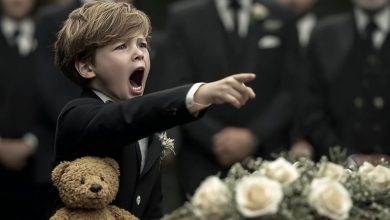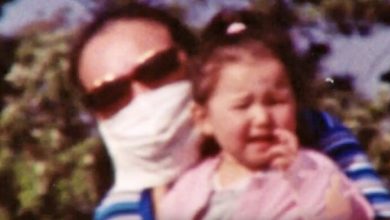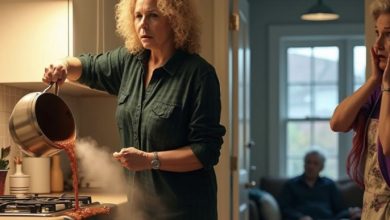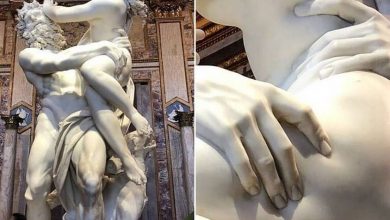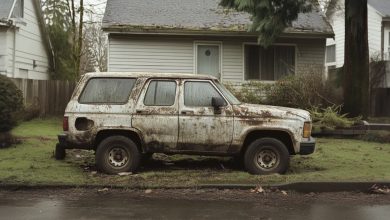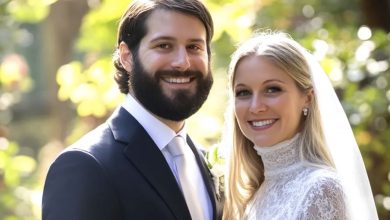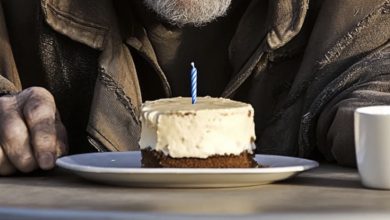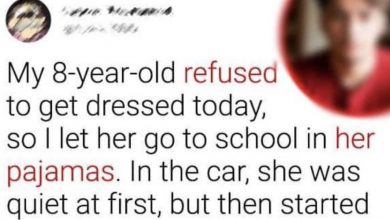“My Boy Was Called a Monster at School. When I Confronted the Bully’s Dad, His Words Left Me Speechless”

My son was bullied at his new school because of the burn marks on his arms. I decided to confront the bully’s father. I expected excuses, anger, maybe even denial. But when this man saw the scars, his face changed completely—and what he whispered left me speechless: “I know those scars.”
I had no idea that this stranger was tied to the worst day of my life. I didn’t know that meeting him would unlock memories I had buried, and lead to a truth that would change both my son’s future and mine.
A Father and His Son
I have been raising my son alone for five years. The night of the fire still plays in my head like an endless nightmare. An electrical fault in our apartment turned our home into an inferno. I lost my wife, Hannah, that night. My son Ethan, who was only three years old at the time, survived—but he carried scars that would never fade.
Doctors saved his life, but almost a third of his body was burned. His small arms and one side of his chest became a map of raised, uneven skin. To me, they were a symbol of survival, of courage. But to the world—especially to children—they were something different, something they didn’t understand.
Ethan grew into a sensitive, bright eight-year-old. He loved dinosaurs, knew the names of dozens of them, and could build entire cities out of Lego blocks. He had a quiet strength, but that strength was tested every day at his new school.
We had moved because of my job. The new district promised better opportunities, better resources, and a safer environment. What no one ever warns you about is how cruel children can be when they see someone who looks different.
At first, it was small things—whispers in the hallway, classmates who avoided sitting near him. But then a boy named Tyler decided to make Ethan his target.
“Am I a Monster?”
It happened one evening while we were sitting at the kitchen table, working on his math homework. Ethan’s voice was quiet, almost a whisper.
“Dad,” he asked, staring at the paper in front of him. “Am I a monster?”
The words hit me like a physical punch. My heart stopped. I leaned down beside him. “Ethan, what are you talking about? Who told you something like that?”
He didn’t look at me. His eyes stayed fixed on the numbers he hadn’t solved. “Tyler,” he mumbled. “He said my arms look like a monster’s. He told everyone at school that’s why Mom died—because monsters can’t have real families.”
Hearing that nearly broke me. My chest filled with rage and grief, but I forced myself to stay calm for Ethan’s sake. I put a hand gently on his shoulder. “Listen to me. You are not a monster. You are brave, smart, and kind. Those scars on your arms—they aren’t ugly. They are proof you survived something most people could never survive. They show how strong you are.”
His eyes filled with tears. “Then why does he keep saying it?”
“Because people sometimes make fun of what they don’t understand,” I explained. “It makes them feel powerful. But it doesn’t make what they say true. You are stronger than any of their words.”
Still, my reassurances weren’t enough to stop the damage. Tyler’s words spread. Soon, other kids were calling Ethan “the burned kid.” Some avoided him as if his scars were contagious. Ethan began having nightmares again, the same kind he had after the fire. He started complaining of stomach aches in the mornings, begging me not to make him go to school.
The School’s Failure
I tried the official channels. I spoke with his teacher, Mrs. Alvarez, who cared deeply but seemed overwhelmed.
“Mr. Walsh,” she said with genuine concern, “I’ve spoken to Tyler about this more than once. I’ve even reached out to his parents. But Tyler is dealing with issues at home, and…” She hesitated. “It’s complicated.”
Then I met with the principal, Dr. Norris. She used polished words about “restorative justice” and “peer mediation.” She gave me pamphlets about anti-bullying programs. But none of that stopped Tyler. In fact, the lack of consequences seemed to give him more power.
The breaking point came one afternoon when Ethan returned from school wearing his favorite blue dinosaur shirt. The front was ripped straight down.
“What happened?” I asked immediately.
“Tyler grabbed it at recess,” Ethan admitted, holding back tears. “He said monsters don’t deserve nice things.”
That night, after I tucked him into bed and watched his small chest rise and fall under the glow of his nightlight, I made a decision. The school had failed him. The system had failed him. It was time for me to take matters into my own hands.
The Confrontation
On Saturday morning, I drove to the Thompson house. It was small, worn down, with peeling paint and an overgrown yard. A pickup truck sat in the driveway. I walked to the door, rehearsing my words. I would be calm but firm. I would tell Tyler’s father that his son’s bullying had to stop.
The door opened, and a tall man in his early forties stood there. His short, graying hair and weary eyes spoke of someone who had seen too much pain. There were faint scars on his hands.
“Yes?” he asked cautiously.
“Are you Tyler’s father?” I asked.
“I am. Jean Thompson. And you are?”
“Jeremy Walsh. My son Ethan is in Tyler’s class.”
Recognition flickered in his eyes, followed by resignation. “Ah. I think I know why you’re here. Please, come inside.”
The living room was modest, furnished with mismatched but clean pieces. Family photos lined the mantel, all of them showing Tyler and his father alone. No mother.
“Your son has been bullying mine for weeks,” I said, my voice hard. “He calls him a monster because of his scars. He ripped his clothes. He’s making his life unbearable.”
Jean’s face drained of color. “Scars?” he asked slowly, his voice suddenly strained. “You said… scars? What kind of scars?”
“Burn scars,” I answered cautiously. “On his arms and part of his chest. From a fire when he was three.”
The man went completely still. His eyes widened. His voice shook. “Can I… see them?”
“Why?” I demanded, suspicious now.
“Please,” he said desperately. “I have to.”
Something in his tone made me pause. I pulled out my phone and showed him a picture of Ethan at the beach, smiling with his arms bare.
Jean’s hands trembled as he stared at the photo. His lips parted. His voice cracked. “Oh my God,” he whispered. “I know those scars.”
The Truth Revealed
My chest tightened. “What do you mean you know them?”
Jean looked at me, his face pale. “What was your wife’s name?”
“Hannah,” I said cautiously.
“And the fire… it was on George Street, wasn’t it? About five years ago.”
My blood ran cold. “Yes. How do you know that?”
Jean sat down heavily, burying his face in his hands. When he finally spoke, his voice broke. “Because I was there. I was the firefighter who pulled your son out of that building.”
The world spun. I could hardly breathe. “That’s impossible,” I whispered.
“My full name is Eugene Thompson,” he explained. “People call me Jean. I carried your boy out. I saved him. But I couldn’t save your wife.”
Tears filled my eyes. “You’re the one…”
He nodded. Slowly, he rolled up his sleeves, revealing puckered scars on his own arms. “I was injured in the fire. Part of the ceiling collapsed on me. But the worst part wasn’t the burns. It was knowing I could only make one trip inside. I heard your son crying. I had to choose between saving him or going deeper for your wife. I’ve lived with that guilt every day since.”
I shook my head. “Jean… you saved my son. Hannah had already passed from smoke inhalation. The chief told me afterward. You made the only choice you could. You gave me back my boy.”
His eyes filled with tears. “You don’t blame me?”
“Blame you? I’ve spent years being thankful to the firefighter who risked his life for Ethan. Now I finally know who he is.”
Tyler Learns the Truth
Jean told me then that Tyler’s mother had left years ago. Tyler was angry, confused, and acting out. He had no idea about the fire. He didn’t know the boy he bullied was the same child his father had saved.
We agreed Tyler needed to hear the truth. Jean called him downstairs. Tyler came in, defensive, already ready to deny everything.
Jean sat him down and told him the story of the fire—the smoke, the collapse, the choice. He ended with the words that silenced the boy completely: “The little boy I saved that night, Tyler… that was Ethan.”
Tyler’s mouth fell open. “What? No… but…”
“His scars,” Jean said gently, “are proof that he survived something unimaginable. They aren’t ugly. They’re proof of courage.”
Tears filled Tyler’s eyes. “I called him a monster…”
Jean nodded. “And that was wrong. You hurt a boy who had already lost more than most adults ever will.”
Tyler cried then, real tears of regret. “I didn’t know. I’m sorry. I’m so sorry.”
A New Beginning
The next Monday, I walked Ethan to school. At the entrance, Tyler and Jean were waiting.
Tyler stepped forward nervously. “Ethan… I’m sorry. I was mean to you. I said terrible things. But I know now that you’re not a monster. You’re a hero. My dad told me the truth.”
Ethan blinked in surprise. “A hero?”
“Yes,” Tyler said. “Because you survived. And because my dad risked his life to save you. He says you’re the bravest person he’s ever met.”
Ethan’s eyes widened. He looked up at Jean. “You’re the firefighter,” he whispered.
Jean knelt down. “I am. And I’ve thought about you every day since that night.”
For the first time in weeks, Ethan smiled. Tyler asked if they could be friends. Ethan nodded. Just like that, the two boys walked into school side by side.
From that day forward, things changed. Tyler became Ethan’s protector instead of his tormentor. Jean and I formed a bond—two fathers connected by one night of fire and loss, and by the shared hope of healing for our sons.
The scars on Ethan’s arms, once the source of shame, became a bridge. A reminder that sometimes, from the deepest pain, new families can be built, and broken hearts can begin to mend.


